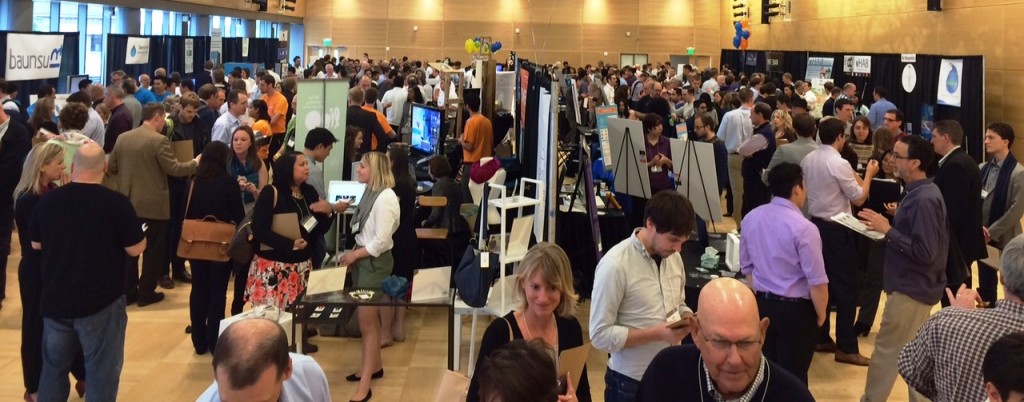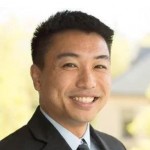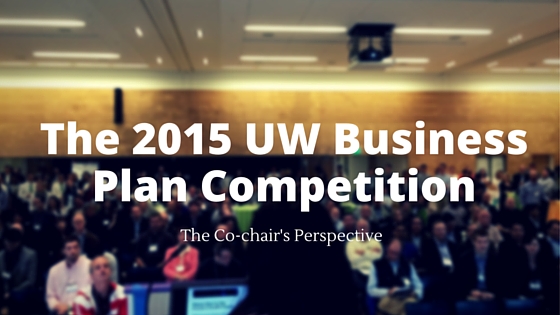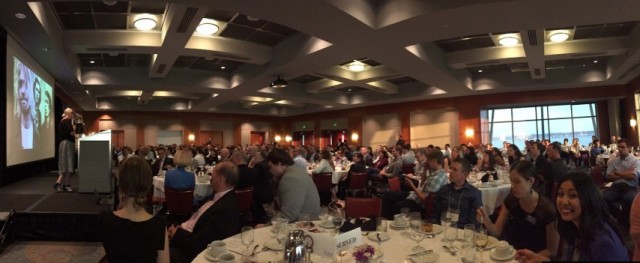The 2015 UW Business Plan Competition: Co-chair perspective
Last year, I had the pleasure of serving as one of the two MBA co-chairs for the Buerk Center of Entrepreneurship’s annual Business Plan/New Venture Competition. This was a priceless experience, and I highly recommend it to anyone considering working in an early-stage startup or starting a new venture.
Follow your Passion
“Just follow your passion.”
That’s the career advice I’ve heard countless times. Follow your dreams, and the rest will come. If you do what you love, you’ll never work a day in your life. When I was in the Air Force, I thought about life on the outside and imagined how great it would be to be your own boss, to be in control of your own destiny. I devoured stories about people starting their own companies, and learned how veterans can be amazing entrepreneurs.
Trouble is, I didn’t know what I was passionate about. I didn’t have one singular problem that I wanted to solve. So I was hoping that a full-time MBA would help me find that problem, and lead me on the path toward becoming the next great entrepreneur. I dove headfirst into the Seattle entrepreneurship community, and went to all the events that I could find through the University of Washington’s Buerk Center for Entrepreneurship.
That’s when I got involved with the UW Business Plan Competition. And it would change my life forever.
The Business Plan Competition (BPC)
Every year for the last 18 years, teams of student entrepreneurs from all over the state of Washington have gathered in Seattle to follow their passion with the UW Business Plan/New Venture Competition (BPC). They compete for the chance to win seed money for their new venture, to get their business off of the ground. Throughout the competition, they receive coaching and valuable feedback from some of the top entrepreneurs and mentors in the Seattle area. They are introduced to a network of potential co-founders and investors. But most importantly, they get to experience what it’s like to take the entrepreneurial leap. They get to experience jumping out of a plane and assembling the parachute on the way down…in addition to managing their progress toward a college degree.
I didn’t have anything that I wanted to jump out of an airplane for, so I dove into research even before the MBA program started. What kinds of problems would an ex-Air Force engineer be uniquely suited to solve? It was like being a solution in search of a problem.
I grappled with this issue for several months until a classmate approached me about being a co-chair for the BPC. The two MBA co-chairs help the Buerk Center of Entrepreneurship prepare, organize, promote, and run the entire BPC process. In exchange, I’d get face-time with many of Seattle’s entrepreneurs, attend all the events, and get an inside look into the judging process. The downside is that I wouldn’t be able to compete in the competition this year.
It was only November, still a long time until the BPC actually started in the following Spring Quarter. That’s plenty of time to get that business idea and build a team, or to join another team as their business expert. But then I thought about the value of being on ‘the inside’ and about all the people I would be able to meet, and decided that being a co-chair would put me in a great position to compete the following year. So I applied, interviewed, and was lucky enough to be offered one of the two co-chair positions.
The 2015 BPC in full swing
The Fall and Winter quarters went quickly. Amy (the BPC program manager), Rosalinda (the other MBA co-chair), and I worked tirelessly to promote the BPC and organize networking events. As a result, we had a record 103 student teams apply when the applications opened in the Spring quarter.
Out of the 103 applications, 37 business ideas were selected to move to the Investment Round. The Investment Round was the first in-person event of the competition, where each team gives pitches in a tradeshow environment. Each judge had a limited amount of points to invest on each venture, and the 16 teams with the most points would move on. For me, this is when the BPC felt real, and I got to see firsthand the level of enthusiasm and energy that each student team had for their idea. It was really inspiring.

After the Investment Round, the top 16 teams were selected to move onto the Coaching Round. From here on, the teams have 15 minutes to present a pitch deck to a small group of coaches and mentors. It was invaluable to hear some teams pitch and observe the feedback that the coaches had for the teams. In these meetings, I saw how truly great coaches and mentors provide constructive criticism and feedback.
The Sweet 16 Round and Final Round were a blur. The 16 student teams from the Coaching Round each pitched in the morning, and by the afternoon only 4 teams remained for the Final Round. Once again, it was remarkable to see the quality of feedback that the teams received, and I was amazed by the depth of discussion that the entrepreneur judges had in evaluating each team.
The student teams were also truly inspiring. Each team pitched their idea with a level of conviction and confidence that I had never seen before. These were truly multi-million dollar ideas, with the right teams to make them happen. Some teams already had traction: ranging from kickstarter campaigns, sales contracts, all the way to six-figure grant awards.
The Dinner and Awards Ceremony
The Awards Ceremony was held immediately after the Final Round at the scenic Bell Harbor Conference Center, just steps from Seattle’s iconic waterfront. Finally, the winning teams would be revealed, and $77,500 in prize funding would be handed out. Seattle restauranteur Linda Derschang (and founder of The Derschang Group) gave a spectacular keynote and described her entrepreneurial journey.
I sat with a team of student entrepreneurs who failed to advance to the Final Round, but had shown up because they were eligible for other prizes. I spoke at length with one of their members, a young lady who had been working with this BPC team for the past year. She talked about how many businesses she helped start, even as a child. She described all the success and traction that her BPC team is experiencing, and how she’s planning on pursuing this venture full-time after graduation. She talked about how her team was going to make a difference. I saw that inner fire that you need to commit to a life of entrepreneurship. I realized that all the student teams that I spoke to shared that same desire…and I didn’t.
I knew then that I don’t have ‘it.’ I felt like the floor had disappeared from underneath me, and I suddenly saw a chapter of my life ending. It felt like the end of a journey that I set on when I decided to leave the Air Force. I just found out if I had what it takes to be an entrepreneur.
Turns out, I don’t. At least not right now.
So what next?
Co-chairing the BPC was enlightening. I met and worked with some amazing people, saw how great entrepreneurs think, and learned how they evaluate opportunities. I was able to scratch an itch that I’ve had for some time, and start a new chapter in my life. While it’s sad to see something end, this feels right for now.
But who knows? There’s always next year’s competition!
About the Author
 Nelson Tang, Class of 2016, is an 8-year Air Force Veteran who is now focusing on marketing and brand/product management. Find out more about Nelson at www.nelsontang.com. For more on the Buerk Center of Entrepreneurship and the UW Business Plan Competition, click here!
Nelson Tang, Class of 2016, is an 8-year Air Force Veteran who is now focusing on marketing and brand/product management. Find out more about Nelson at www.nelsontang.com. For more on the Buerk Center of Entrepreneurship and the UW Business Plan Competition, click here!


